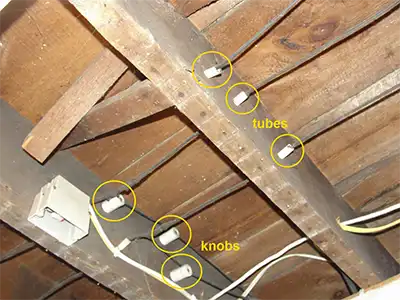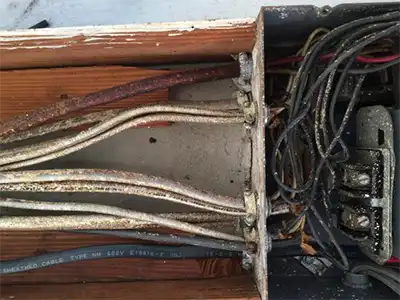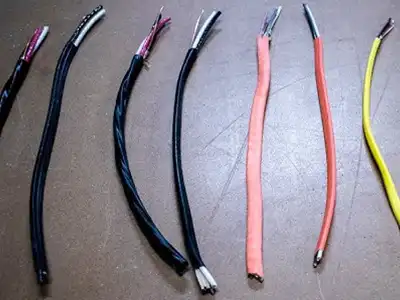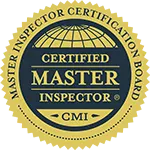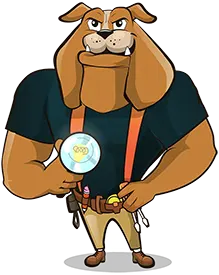Kansas City Electrical Inspectors | Expert Electrical Inspection
Table of Contents
The Electrical Inspection
A home’s electrical service has changed alot over the last 150 years and for good reasons:
- Bigger homes
- More energy efficient homes
- Safer homes
- More electronics
- Updated wiring methods
- New wiring materials
- Better wiring components
Not to mention, wiring that was generally considered unsafe even brand-new 100-years-ago, which makes it even moreso now that it’s outdated and brittle.
This is why a good electrical inspection requires experience, not just knowledge.
A proper electrical inspection also:
- Establishes service size
- Determines current problems
- Looks for clues of past problems
- Anticipates future problems
- Tests electrical components
- Finds electrical glitches
And it starts outside the home.
Outside the home
The electrical inspection starts outside the home at the pole or service meter.
THE POLE:
The pole is checked, the service cable is inspected for clearances and damage, and the service mast is studied for movement.
Then the service cables are inspected for size and make sure they’re attached to the house, and undamaged.
The electrical service meter is also checked for size, it’s sealed to siding, and not pulling away from home.
THE SERVICE LATERAL:
If there is no pole, the service cables connect to the electrical service meter through a large plastic pipe that comes up from the ground. This is checked for size, damage, cracks, and movement.
Exterior outlets are also checked for GFCI protection.
Your Home’s Electrical Service Size
Some folks look at the main circuit breaker and call it quits.
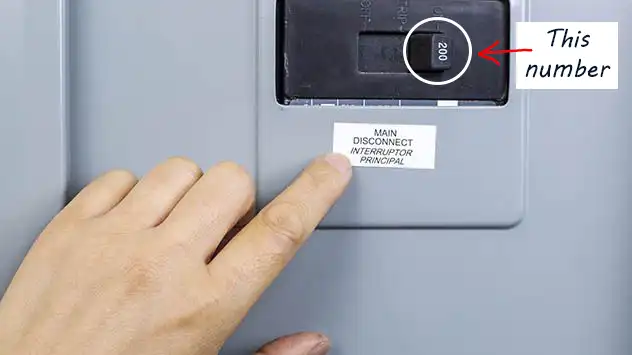
They think the number on the main breaker is the size of the home’s electrical service.
If only life were that simple.
I mean, what if your panel DOESN’T even have a main breaker?
Well, there are 5 things that play a part in figuring the size of your home’s electrical service.
And the SMALLEST rating of these 5 will be the lucky winner of the chicken dinner:
- Service cables
- Service conduit
- Service meter
- Main panel
- Main breaker
Think of it like a bottleneck:
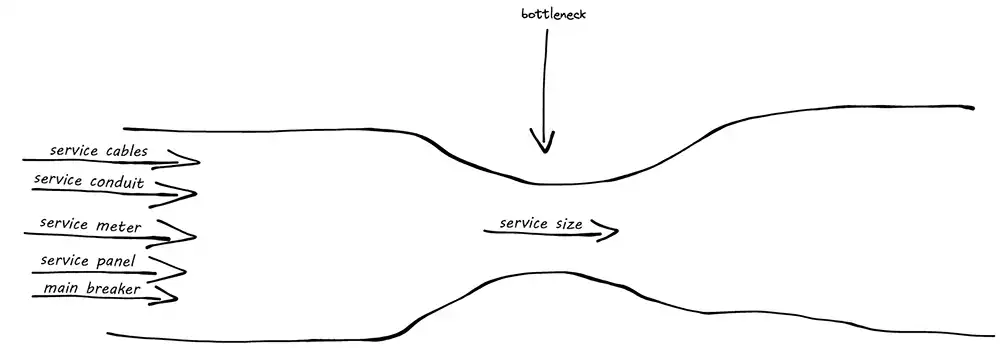

So if…
- Service cable = 60-amp
- Service conduit = 100+ amp
- Service meter = 200-amp
- Main panel = 100-amp
- Main breaker = 200-amp
Your home’s service size = 60-amps
Inside the home
Once inside, the electrical inspection starts in the attic and continues to the basement where open junction boxes and exposed spliced wiring is common.
Throughout the home, every accessible outlet, light, and switch are tested for safe and proper operation.
Common Electrical Issues Found Inside Every Home
- Ungrounded 3-prong outlets
- Loose outlets and switches
- Missing outlet covers
- Bad 3-way switches
- More than one GFCI outlet on a circuit
- Lights on on GFCI circuit
- Appliances on GFCI circuit
- Garage door openers on GFCI circuit
The garage, bathrooms, kitchen, and basement outlets are also checked for GFCI protection.
Finally, the main electrical panel is inspected.
The Main Panel Electrical Inspection
- Safety First
- Not standing in water
- Not arcing, buzzing, or hot
- Clear space
- Height
- Twistouts
- Knockouts
- Manufacturer
- Panel size
- Circuit breakers
- Tight
- No rust
- Correct wiring
- AL/CU
- AFCIs
- GFCIs
- No water or rust
- Not inside bathroom or closet
- Correct screws
- No nicked, cut, pinched, or punctured wires
- Service cables size
- Main breaker size
Ideally, the panel cover is removed so the interior can be checked for moisture, rust, and corrosion.
Next, we jot down the type of panel installed then check the condition of the circuit breakers and wiring.
If the panel is known to be unsafe or recalled, we’ll check for any unsafe conditions and past problems.
If there are any sub-panels, they’re also inspected to make sure they’re wired properly (sub panels are wired differently than main panels).
Expert Electrical Inspections in Kansas City
Being the community’s go-to electrical inspection Company in Kansas City is something we at Bulldog Professional Inspection Services are proud of. Our team of seasoned experts specializes in carefully and precisely examining electrical systems. Whether you’re a property manager, real estate agent, or homeowner, our thorough inspections offer important information on the functionality and safety of your electrical components. We make certain that your electrical system satisfies all criteria while upholding industry standards. For dependable, in-depth, and client-focused electrical inspections, rely on Bulldog.
A note about ‘grandfathering’
A grandfather clause, also known as a grandfather policy, grandfathering, or grandfathered in, is a provision that states certain NEW RULES DO NOT APPLY OR MAY SUPERCEDE THE ORIGINAL RULES that were in place when the home was built.
In the case of a home’s electrical inspection, if it remains original and untampered, code updates cannot be required or enforced when they happen.
Worthwhile safety upgrades may be discussed and possibly recommended during the electrical inspection, but no enforcement can take place so long as it remains locked in the time capsule of when it was built.
However, if the home ever needs work that requires a building permit, that work will be subject to the current building codes ALONG WITH any other support systems or components affected by it.
30 Min. Home Inspection Checklist – Only $18.99
Would YOU Like to Check the Bones Yourself BEFORE the Home Inspection?
This no-nonsense field guide is based on our Major-Items Inspection and will help you decide BEFORE your home inspection if the home has good bones or is just a money pit in disguise.
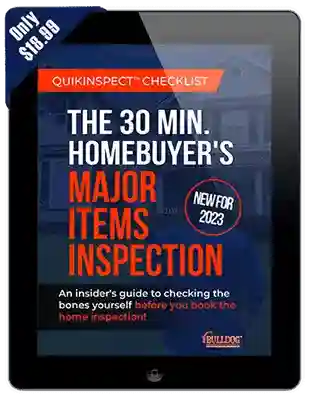

13 Pages Fully Illustrated
Immediate PDF delivery + flipbook
Save time and hundreds (sometimes thousands) in wasted home inspection fees.
By finding out for yourself if there are major issues hiding in plain sight BEFORE the home inspection.
Find out for yourself if there are major issues hiding in plain sight BEFORE the home inspection.

